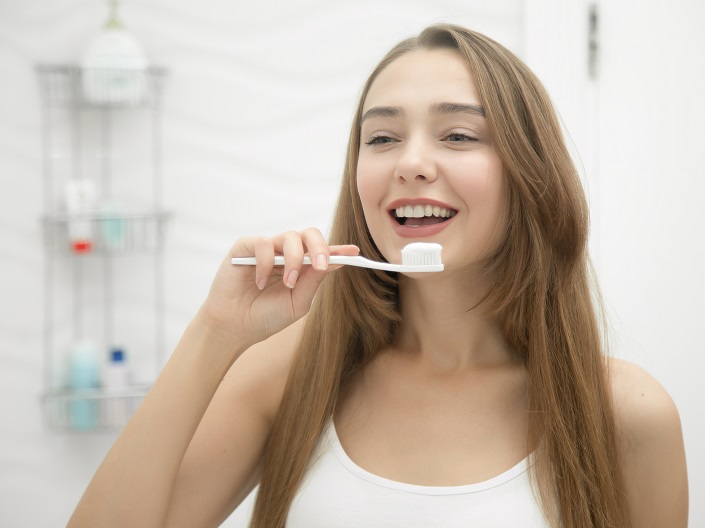A lot of people think that good oral hygiene is just only for having strong teeth and fresh breasts but no! Maintaining good oral health and hygiene is essential for overall health and well- being. It not only prevents cavities, gum diseases and bad breath but also contributes to overall health factors like reducing the risk of heart diseases and diabetes.
So, today let’s discuss how one can maintain good oral health according to each stage and age in life.
Oral Hygiene in Infants (0-2 Years)
Oral hygiene during infancy sets the foundation for healthy teeth and gums later in life. That is why oral care begins at birth, even before a baby’s first tooth emerges.
Tips for Infant Oral Care:
- Wipe your babay’s gums with a soft and clean cloth after feedings to remove bacteria and leftover food particles.
- When the first tooth appears, try brushing with a soft bristle toothbrush with a tiny amount of fluoride containing toothpaste.
- Have regular dentist visits when the baby starts to develop a tooth set and start nibbling on things.
Oral Hygiene for Toddlers and Young Children (3-6 Years)
With the development of independent brushing habits in children as they grow, parents should be there to guide them in order to ensure that they are brushing properly and on time.
Tips for Oral Care in Young Children:
- Introduce flossing to the children and try to include it in their daily brushing routine.
- Put limits on sugary and highly processed food as it can lead to early tooth decay problems.
- Make sure that the child brushes his/ her teeth for at least two minutes under the guardian’s supervision.
- Increase the toothpaste amount and size of the toothbrush of the child.
Oral Hygiene for Pre-Teens and Teenagers (7-19 Years)
Teenagers become more independent, but they are also prone to bad oral habits like skipping brushing, consuming sugary drinks, or neglecting dental visits.
Tips for Pre-Teens and Teenagers:
- Encourage your teen to focus on oral health and hygiene and educate them about how important it is to have healthy teeth and gum or the overall health of the body.
- Encourage consistent brushing and flossing.
- Try to keep their diet clean and reduce teeth damaging ingredients like soda, energy drinks, sugary candies, etc.
- If braces or aligners are required, follow the orthodontist’s guidelines for cleaning and maintenance.
- Educate teens about the dangers of smoking, vaping, and oral piercings, which can lead to gum disease and infections.
Oral Hygiene for Adults (20-50 Years)
Adulthood brings new dental challenges, such as tooth sensitivity, gum disease, and stress-related conditions like teeth grinding (bruxism). Maintaining oral health requires a consistent routine and lifestyle adjustments.
Tips for Adult Oral Care:
- Continue brushing twice a day with fluoride toothpaste and flossing to remove plaque and food particles.
- A fluoride or antibacterial mouthwash can help reduce plaque and prevent gum disease.
- Drink plenty of water to wash away food debris and prevent dry mouth, which can contribute to tooth decay.
- Both habits increase the risk of gum disease, oral cancer, and tooth loss.
- Teeth grinding (bruxism) caused by stress can wear down enamel. Use a mouthguard at night if necessary.
Oral Hygiene for Seniors (50+ Years and Older)
As we age, oral health challenges such as gum disease, dry mouth, tooth loss, and weakened enamel become more common. Extra care is needed to maintain a healthy smile.
Tips for Senior Oral Care:
- Aging can make gums more sensitive. A soft-bristled brush prevents irritation while cleaning effectively.
- If using dentures, clean them daily and ensure a proper fit to prevent irritation and infections.
- Many medications cause dry mouth, increasing the risk of cavities. Drink water frequently and use sugar-free lozenges to stimulate saliva production.
- Eat foods rich in calcium and vitamin D to support strong teeth and bones.
- Regular dental visits help detect oral cancer early, which is more common in older adults.
General Tips for Good Oral Hygiene at Every Age
Regardless of age, following these general oral hygiene tips can help maintain healthy teeth and gums:
- Use toothpaste that has fluoride in it to brush teeth.
- Brush your teeth twice a day, morning and just before going to bed.
- Flossing daily helps to remove plaque and food particles that still remain stuck in between teeth even after brushing properly.
- Use a toothbrush that has soft bristles and also make sure to keep on changing it after 3-4 months.
- Limit on sugar and acidic food as they increase the risk of tooth decay and enamel erosion.
- Tobacco and alcohol consumption causes gum diseases and even mouth cancer.
All of these tips and daily oral hygiene habits are very important but still what can not be replaced is the importance of regular checkups by a dentist. So, what you need is to look for a dentist near me and book your appointment as soon as possible to ensure that you have a healthy and beautiful smile.




